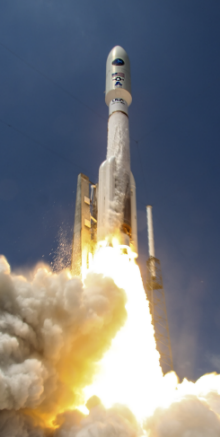SpaceX launches protest of Air Force rocket contract
The commercial space company says the Air Force's sole-source award to United Launch Services should have been competed.
Commercial space upstart Space Exploration Technologies is formally protesting the U.S. Air Force's recent sole-source acquisition of United Launch Alliance (ULA) rockets.
SpaceX CEO Elon Musk said his aerospace company, based in Hawthorne, Calif., will protest an Air Force award last December to ULA. The sole-source contract covers Air Force satellite launches aboard ULA's Evolved Expendable Launch Vehicle (EELV) over the next five years. That includes 36 EELV cores. The Air Force contract is worth $530.7 million.

"This is not SpaceX protesting and saying that these launches should be awarded to us. We're just protesting and saying these launches should be competed," Musk said at the Washington Press Club on April 25. "If we compete and lose, that's fine, but why wouldn't [the Air Force] even compete it?"
SpaceX asserted that it could launch Air Force satellites for as little as four times less than ULA. Based on Defense Department budget figures, the company calculates that ULA rockets cost the government an average of $460 million per launch. Musk said launching Air Force satellites using the SpaceX Falcon 9 rocket would cost about $90 million, a figure that includes required "mission assurance" coverage.
The commercial price of a Falcon Heavy launch is $135 million, SpaceX said.
The Air Force contract also provides launches services to spy satellites operated by the National Reconnaissance Office. Rocket configurations included under the contact are the Air Force Atlas V 501 and 511, Air Force Delta IV and the NRO Delta IV Heavy.
SpaceX said it would file its protest with the U.S. Court of Federal Claims on April 28.
Congressional critics have lately resumed complaints about ULA's launch monopoly and its reliance on the Russian-made RD-180 engine that powers the main stage of the Atlas V. Earlier this month, seven U.S. senators urged Defense Secretary Chuck Hagel in a letter to expand competition for Air Force satellite launch contracts.
The letter was prompted by a decision to reduce competition for Air Force EELV launches from 14 to seven through 2017.
ULA has so far remained silent on the protest.
SpaceX, the first private company to return a craft from low-Earth orbit, has been conducting tests and working with the Air Force toward certification for the Falcon 9. The company also has been using the rocket to deliver supplies to the International Space Station.
NEXT STORY: Navy advancing carrier-based drone program